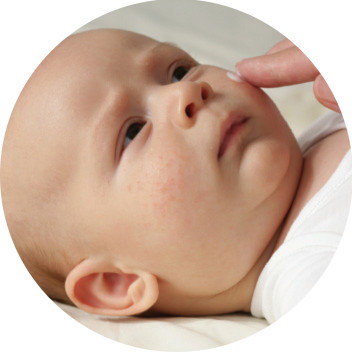Infant eczema
In Specialist milks
Follow this topic
Bookmark
Record learning outcomes
When discussing infant formula milks, you may not automatically think of atopic eczema. Yet intact cows' milk protein can increase the risk of eczema in babies with a family history of allergy

Atopic eczema causes skin to become itchy, red, dry and cracked. It often starts between the ages of two and four months and affects around one in five children.
Symptoms
Common symptoms include patches of red, dry, itchy skin on the cheeks, forehead and scalp, behind the ears and in the creases of the neck, knees and elbows. The condition can also 'flare up'. When this happens, symptoms will worsen and the skin can become infected.
Causes
The cause of eczema is unknown, but it tends to be common among babies born in families that have a history of eczema, hayfever, and asthma. ('Atopic' means sensitive to allergens.) It may also be triggered by food allergies, including an allergy to cows' milk. Flare-ups may be triggered by exposure to allergens such as house dust mites.
Environmental factors, irritants such as scratchy woollen clothes, stress, heat and sweat can also worsen symptoms. A GP will often be able to diagnose atopic eczema by assessing the child's skin.
Treatment
There is no cure for atopic eczema, but the condition often improves as children get older. It is, however, important to manage symptoms. An effective skincare routine is a key part of controlling symptoms. Parents are advised to:
- Bathe their infant using an emollient wash
- Apply an emollient cream generously and frequently, including after bathing, to relieve dry skin.
This is known as complete emollient therapy.
A topical corticosteroid may be prescribed for use during flareups, alongside emollients. This will reduce redness and swelling and is safe as long as it is used as directed by a GP.
Formula milks
 Research has shown that infants with a family history of allergy who are fed infant formula milk based on intact cows' milk protein have double the risk of developing atopic eczema compared to those who are breastfed. Breastfeeding provides the best protection against allergy development, but if exclusive breastfeeding is not possible, an infant formula milk (such as SMA H.A. Infant Milk) which can help reduce the risk of an infant developing atopic eczema, could be suitable.
Research has shown that infants with a family history of allergy who are fed infant formula milk based on intact cows' milk protein have double the risk of developing atopic eczema compared to those who are breastfed. Breastfeeding provides the best protection against allergy development, but if exclusive breastfeeding is not possible, an infant formula milk (such as SMA H.A. Infant Milk) which can help reduce the risk of an infant developing atopic eczema, could be suitable.
It should be used from the first formula feed onwards, either in combination with breast milk or on its own. An independent clinical study, the German Infant Nutritional Intervention (GINI) study, demonstrated that SMA H.A. Infant Milk reduces the risk of developing atopic eczema by over 50 per cent in the first year of life and has a sustained, 10-year long-term effect.
IMPORTANT: SMA H.A. Infant Milk should not be used if a baby has already been diagnosed with, or is suspected of having, an allergy to cows' milk protein.
Read all the articles in this section? Now test your knowledge and add this to your learning log.
